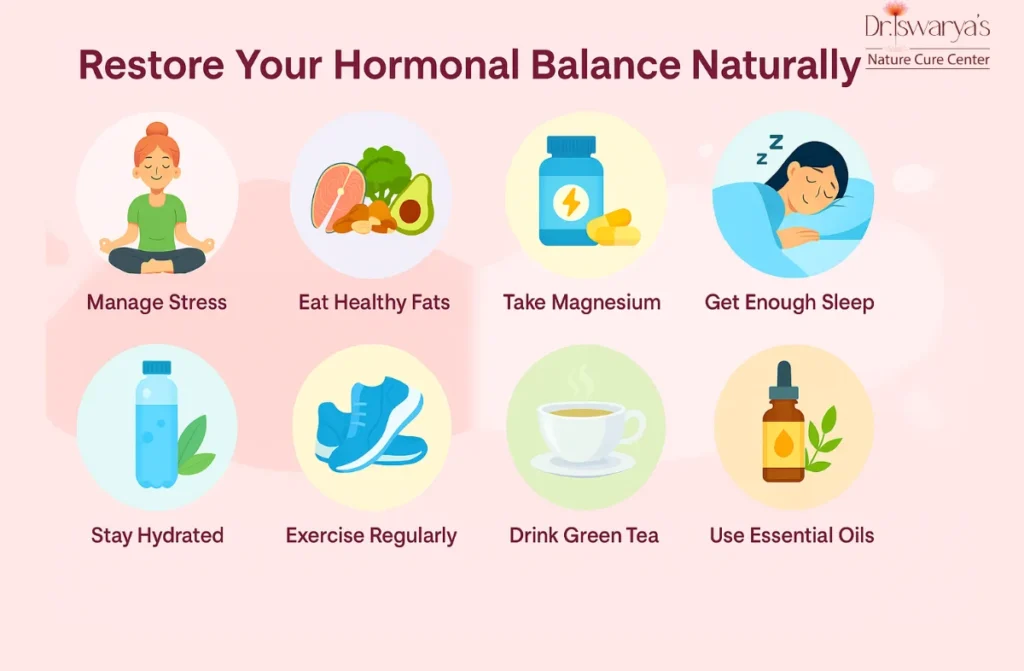Hormonal imbalance can quietly disrupt everything from mood and metabolism to skin and sleep. Hormonal imbalance natural treatment offers a gentle, root-focused way to restore internal harmony without harsh medications. It blends nutrition, herbs, movement, and stress relief into a personalized healing path. The result? A balanced body that thrives naturally.
What are Hormones?
Hormones are natural chemical messengers that control key functions like mood, energy, metabolism, and fertility. Produced by glands in the endocrine system, they travel through the bloodstream to organs and tissues. When hormone levels shift too high or low, it causes symptoms like fatigue, weight changes, or irregular periods. Hormonal imbalance natural treatment helps correct these disruptions using food, herbs, stress relief, and lifestyle support restoring the body’s ability to regulate hormones naturally and maintain long-term balance.
How Can I Balance My Hormones?
With the right habits, natural treatment for female hormone imbalance can restore your body’s rhythm.
- Eat Hormone-Friendly Foods: Choose leafy greens, seeds, and healthy fats. Avoid refined sugar and processed items.
- Reduce Stress Naturally: Try yoga, meditation, or breathwork to lower cortisol and support hormone balance.
- Sleep Well: Aim for 7–8 hours daily. Rest helps reset cortisol, melatonin, and reproductive hormones.
- Exercise Moderately: Light workouts like walking or yoga support hormones without stressing the body.
- Use Herbal Support: Ashwagandha, chasteberry, or maca may ease symptoms when used with guidance.
- Avoid Hormone Disruptors
Limit plastic use and choose natural personal care products to reduce chemical exposure. - Support Gut & Liver Health
Eat fiber and fermented foods to help eliminate excess hormones and detox naturally.

10 Natural Ways to Balance Your Hormones
Hormones affect everything from mood and energy to metabolism and fertility. Whether you’re looking for a hormonal imbalance natural treatment or gentle ways to support overall wellness, these natural approaches can benefit both men and women. Here’s how you can start healing through daily lifestyle shifts.
1. Eat a Hormone-Balancing Diet
- Focus on whole foods like leafy greens, cruciferous vegetables, seeds, and whole grains to regulate estrogen and insulin levels.
- Reduce sugar, processed foods, and artificial additives that disrupt hormone production and increase inflammation.
- Flaxseeds and pumpkin seeds are great for balancing estrogen naturally, making them ideal for natural treatment for female hormone imbalance.
2. Prioritize Quality Sleep
- Aim for 7–8 hours of uninterrupted sleep, as hormone repair happens primarily at night.
- Poor sleep can disrupt cortisol and insulin, increasing the risk of imbalance in both men and women.
- Create a relaxing bedtime routine to support melatonin production and hormone regulation.
3. Manage Stress with Mindfulness
- Chronic stress raises cortisol, which can throw off reproductive and thyroid hormones.
- Daily practices like meditation, breathwork, or even journaling calm the nervous system.
- For male hormone imbalance natural treatment, reducing stress helps normalize testosterone and adrenal hormone levels.
4. Exercise Regularly but Gently
- Choose low-impact workouts like yoga, walking, or swimming, which improve circulation and reduce cortisol.
- Overtraining can spike stress hormones, worsening hormone-related issues such as irregular cycles or low libido.
- Movement also boosts mood-related hormones like serotonin and dopamine, improving overall balance.
5. Support Gut Health Naturally
- A healthy gut helps metabolize and eliminate excess hormones like estrogen.
- Eat fiber-rich foods, fermented items (like curd or kimchi), and hydrate well to support digestion.
- Gut-friendly nutrition is a key part of hormonal imbalance natural treatment for both men and women.
6. Include Healthy Fats in Your Meals
- Good fats are the building blocks of hormones. Include avocados, nuts, seeds, olive oil, and fatty fish.
- These fats support hormone production and reduce inflammation, especially in cases of low progesterone or testosterone.
- A fat-deficient diet often leads to fatigue, low libido, and unstable moods.
7. Avoid Endocrine-Disrupting Toxins
- Everyday chemicals in plastic, cosmetics, and cleaning agents can mimic or block natural hormones.
- Use glass or steel containers, and switch to natural skincare to lower exposure.
- This is especially crucial in any hormone imbalance in men natural treatment, where external toxins may reduce testosterone.
8. Use Herbal Remedies Thoughtfully
- Herbs like ashwagandha, maca, and chasteberry are known to support hormone balance gently.
- These are best taken under professional guidance to avoid unintended side effects.
- Herbal support is often used in natural treatment for female hormone imbalance, particularly for irregular cycles or PMS.
9. Practice Cycle Syncing
- Women can adjust exercise and diet based on their menstrual cycle phases for better hormonal harmony.
- For example, intense workouts during ovulation and gentler routines during menstruation can reduce fatigue and hormonal stress.
- This method helps regulate periods and supports natural fertility.
10. Stay Hydrated and Limit Caffeine
- Proper hydration helps flush out excess hormones and supports metabolism.
- Too much caffeine can elevate cortisol, disturb sleep, and worsen anxiety—factors that directly affect hormonal health.
- Replace some caffeine with herbal teas like chamomile or tulsi for a gentler energy boost.
These natural strategies offer long-term support for anyone exploring hormonal imbalance natural treatment, from natural treatment for female hormone imbalance to hormone imbalance in men natural treatment. With consistency, these small changes lead to lasting hormonal stability and improved overall health.
For Females: Managing Hormonal Imbalance Naturally
Effective natural treatment for hormonal imbalance in women focuses on restoring balance gently through daily choices.
- Avoid Toxins: Choose natural products to reduce xenoestrogen exposure and support true balance.
- Hormone-Friendly Foods: Eat cruciferous veggies and seeds like flax to balance estrogen and progesterone.
- Herbal Support: Herbs like chasteberry and ashwagandha ease PMS, fatigue, and mood changes.
- Gentle Exercise: Choose yoga or walking to reduce cortisol and support cycle health.
- Cycle Syncing: Align food and activity with menstrual phases to reduce stress and hormonal dips.
- Liver Support: Use lemon water, greens, or dandelion tea to flush out excess hormones.
- Stress Relief: Practice breathwork or journaling to calm the nervous system and balance hormones.
- Better Sleep: Sleep before 11 PM and reduce screens to support hormone repair.
For Males: Managing Hormonal Imbalance Naturally
Hormonal imbalance in men can affect energy, mood, muscle mass, libido, and sleep quality. Addressing the root causes through a consistent routine and lifestyle changes is essential. The following methods offer sustainable and safe male hormone imbalance natural treatment.
- Boost Testosterone Through Diet: Zinc-rich foods like pumpkin seeds, spinach, and eggs help support natural testosterone production. Reducing processed sugar and refined carbs helps regulate insulin, which in turn keeps testosterone levels stable.
- Use Strength Training Wisely: Resistance exercises, such as weightlifting, naturally increase testosterone and growth hormone levels. However, overtraining can lead to cortisol spikes, so recovery time and rest are equally important.
- Adaptogenic Herbs for Hormonal Support: Ashwagandha and ginseng help manage stress-related hormone disruptions. They improve stamina, reduce cortisol, and support a balanced endocrine system without artificial interventions.
- Support Liver Function: The liver metabolizes hormones; when sluggish, it can lead to estrogen dominance in men. Foods like garlic, turmeric, and bitter greens enhance detox pathways and hormone clearance.
- Sleep for Hormonal Repair
Deep sleep is when testosterone is primarily produced. Ensuring 7–8 hours of uninterrupted rest and reducing blue light exposure before bed promotes natural hormone regulation. - Manage Stress Levels: Chronic stress elevates cortisol, which directly suppresses testosterone. Mindfulness practices, physical activity, and even simple breathing exercises can help restore balance.
- Reduce Endocrine Disruptors: Plastics, chemical-laden grooming products, and pesticides can interfere with male hormones. Switching to natural alternatives reduces this toxic burden and supports hormonal health.
- Healthy Fats for Hormone Production: Testosterone is made from cholesterol, so healthy fats like avocado, nuts, and olive oil are essential. These also support brain function and energy metabolism in men.
Hormonal Imbalance Symptoms
Hormonal imbalances can manifest in diverse ways, affecting both physical and emotional well-being. Recognizing these symptoms early can help guide individuals toward effective natural treatment for hormonal imbalance in women and hormone imbalance in men natural treatment.
- Cognitive difficulties and memory lapses: Fluctuating estrogen, testosterone, or thyroid levels can impact focus and memory. Individuals may notice difficulty concentrating, forgetfulness, or slower cognitive processing, highlighting the need for targeted natural treatment strategies.
Mood swings and mental health changes: Hormonal fluctuations can lead to irritability, anxiety, or depression. Women may notice heightened emotional sensitivity during menstrual cycles or menopause, while men with low testosterone can experience low motivation and persistent sadness. - Fatigue and sleep disturbances: Imbalances in thyroid hormones or cortisol can disrupt sleep patterns and reduce energy levels. This often results in chronic fatigue, difficulty staying asleep, or feeling unrested even after adequate sleep.
- Weight changes and metabolism issues: Hormones like insulin, thyroid hormones, and estrogen significantly influence metabolism. Sudden unexplained weight gain or difficulty losing weight may indicate an imbalance, which can be managed through natural treatment for hormonal imbalance in women or hormone imbalance in men natural treatment.
- Reproductive and sexual health symptoms: Women may experience irregular periods, hot flashes, or decreased fertility, while men may notice reduced libido, erectile difficulties, or low sperm count. Addressing these imbalances naturally can improve reproductive health and restore hormonal equilibrium.
- Skin, hair, and nail changes: Hormonal disruptions can trigger acne, excessive hair growth or hair thinning, and brittle nails. Monitoring these changes can help identify underlying hormonal issues and guide natural interventions.
- Digestive and appetite shifts: Hormones influence digestive enzymes and hunger signals. Imbalances may lead to bloating, irregular bowel movements, or sudden cravings for specific foods, which can be managed through lifestyle and dietary adjustments.
How Can I Prevent a Hormonal Imbalance?
Preventing hormonal issues begins with long-term, consistent habits that support the body’s natural endocrine function. The following methods align with effective hormonal imbalance natural treatment, helping reduce the risk before symptoms arise.
- Maintain Balanced Nutrition: Eating whole foods rich in fiber, antioxidants, and essential fats supports hormone production and detoxification. Avoiding refined sugars and processed foods helps stabilize insulin, a key hormone linked to many imbalances.
- Support Gut Health: A healthy gut promotes nutrient absorption and helps eliminate excess hormones. Include fermented foods, prebiotics, and adequate hydration to maintain a strong digestive system.
- Prioritize Quality Sleep: Sleep allows the body to regulate cortisol, melatonin, and reproductive hormones. Keeping a consistent sleep schedule and avoiding screens before bed supports hormonal repair.
- Manage Stress Effectively: Chronic stress affects adrenal function and can disrupt the balance of estrogen, progesterone, and testosterone. Simple tools like daily breathwork, short walks, or journaling can reduce cortisol buildup.
- Avoid Environmental Toxins: Endocrine-disrupting chemicals are found in plastics, non organic food, and household products. Choosing natural alternatives helps protect hormonal health over time.
- Exercise in Moderation: Movement regulates insulin and improves circulation, both vital for hormonal health. However, excessive high-intensity workouts can increase stress hormones balance is key.
- Stay Consistent with Routine: Hormones thrive on rhythm regular meals, sleep, and exercise help the body anticipate and regulate hormonal fluctuations more effectively.
Conclusion
Taking care of your hormones is a long-term commitment to rhythm, balance, and nourishment. With mindful daily choices, the body naturally regulates itself without the need for aggressive intervention. Practicing these habits acts as a sustainable hormonal imbalance natural treatment, restoring stability and improving overall quality of life. Holistic methods offer lasting wellnessn inside and out.
Read Also: Tips to Help You Lose Weight Naturally

